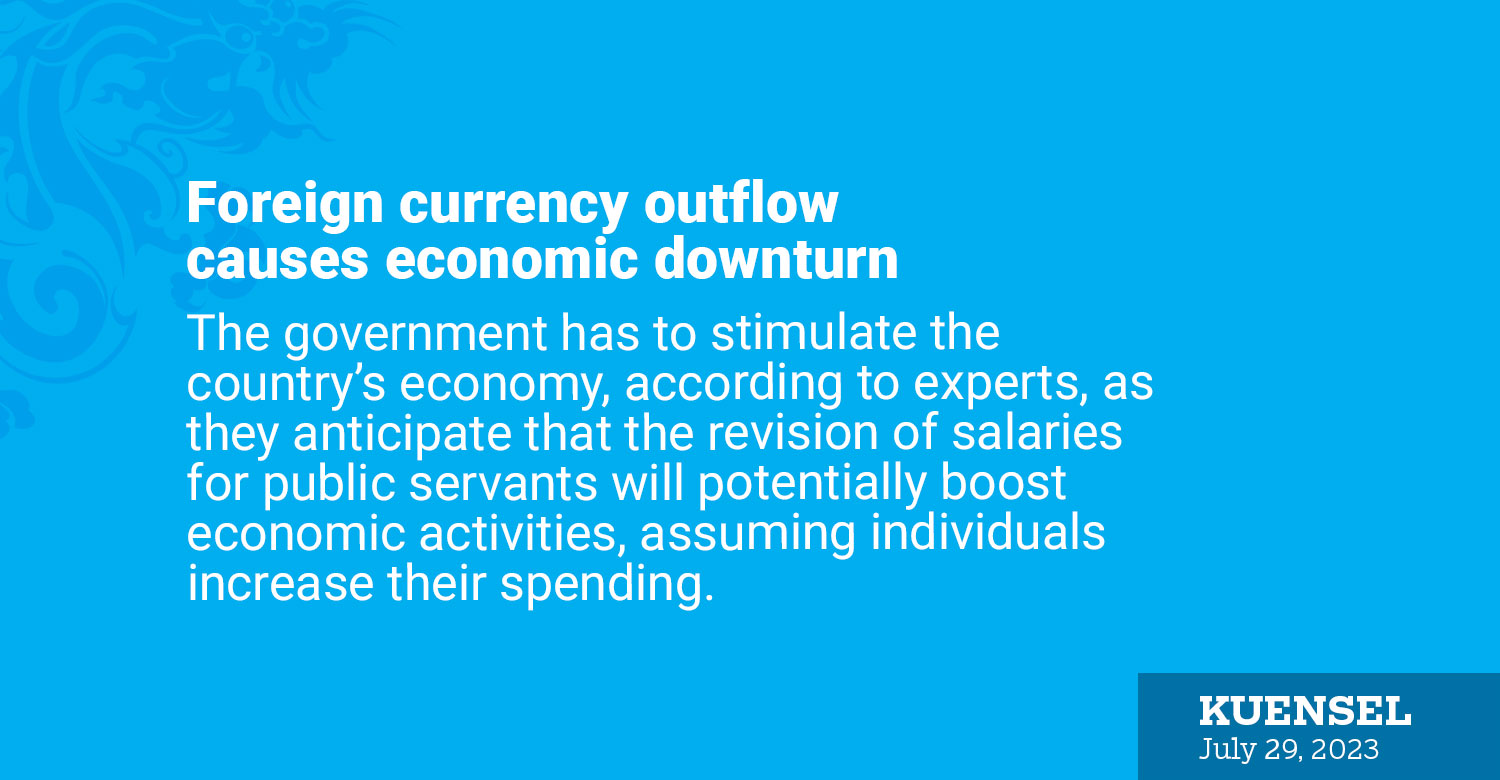Finance Ministry released revised salaries for public servants yesterday
Rinzin Wangchuk
The government has to stimulate the country’s economy, according to experts, as they anticipate that the revision of salaries for public servants will potentially boost economic activities, assuming individuals increase their spending.
With the adoption of Pay Revision Bill 2023 by the Parliament on July 4, public servants received their revised salaries ranging from 55 to 74 percent from yesterday along with an existing 20 percent housing allowance. “The Ministry of Finance has released revised salaries to the public servants through budgetary agencies yesterday,” an official from the ministry said.
However, the question remains whether this salary revision alone will suffice to effectively stimulate the economy. The situation is complicated by a growing trend of people, mostly civil servants, leaving Bhutan to work abroad, taking their retirement benefits and savings with them.
For example, a senior corporate employee, who resigned last month, invested more than Nu 1.8 million to pursue a master’s degree in media and communications in Australia. He paid Nu 0.7 million as tuition fees for one semester and spent over Nu 0.29 million on visa fees, insurance, airfare, and interest for an education loan.
Additionally, he had to keep a provision of a minimum of Australian dollars (AUD) 10,000 (Nu 0.58 million) to buy a car and AUD 5,000 (Nu 0.290 million) to pay in advance to rent a flat.
On average, Nu 1.8 million equivalent in hard currency is draining out of the country per person.
Over the past six months, the Royal Civil Service Commission (RCSC) alone lost 2,934 civil servants due to voluntary resignation and superannuation.
One analyst pointed out, “If we include the number of people from corporate, business, and private individuals who migrated to countries like Australia, Canada, Middle East, USA, Japan, and Malaysia in the migration list, the number could exceed 6,000 not counting their spouses and dependents”.
Last year, about 16,970 people migrated from Paro International Airport alone in 2022.
Assuming 6,000 individuals migrated in the last six months, the total money outflow would exceed Nu 10.8 billion or equivalent to USD 129.65 million or AUD 192.51 million as per the exchange rate on July 27.
A concerned citizen remarked, “Because of the exodus of migration, our foreign currency reserve is depleting at an alarming rate without any backing security.”
During the joint sitting of the Parliament on July 4, members of both the National Assembly and the National Council expressed growing apprehension over the dwindling foreign reserves in the country.
According to the Royal Monetary Authority’s (RMA) figures, the country’s reserve declined by 29 percent to USD 698.3 million as of March this year from USD 984.8 million in March last year, which was sufficient to cover only 13.9 months of essential imports.
A conundrum in Bhutan’s migration
One analyst also noted that if more Bhutanese students choose to study in Australia and need to exchange their Ngultrum for AUD, there will be an increase in demand for foreign currency and a decrease in demand for the local currency. “This increased demand for AUD can cause the Ngultrum to depreciate in value relative to the AUD,” he said. “In other words, the exchange rate of the Ngultrum weakens.”
According to an economist, when the domestic currency weakens, the cost of imported goods and services rises, leading to higher inflation rates in the domestic economy. “This, in turn, can impact the purchasing power of the local people,” he said.
Due to these factors, a bank official said that the outflow of spending and saving activities is occurring outside the country, leading to a decrease in the money supply within Bhutan and impacting the country’s foreign currency reserves.
Need to control unnecessary imports
The bank official added that salary revision will encourage more savings and consumption, which will positively impact overall economic activities in the country. “But the overall impact will depend upon our foreign currency and INR reserves situation of the country because we import everything,” he said.
Bhutan being an import-dependent country, the reserve is necessary to trade with other countries. The significant outflow of foreign currency due to students studying abroad contributes to a deficit in the current account of the balance of payments.
A corporate official raised concerns over unnecessary imports, including junk food from Korea and Thailand, which contribute to the outflow of convertible currency. He questioned the importation of alcohol, considering its negative impact as the biggest killer in the country.
In times of economic recessions, one senior bank official recommends increasing government spending and expanding credit from financial institutions to boost money circulation in the market. A robust money supply stimulates the purchasing power of the people and rejuvenates the supply chain, fostering economic growth. “However, it is not happening as expected,” he said. “The central bank has still suspended loans in some sectors that are impeding economic activities.”
According to the bank official, when this occurs, the supply of goods and services will increase, leading to an upswing in the overall level of the economy. However, he pointed out that the government lacks funds to bolster its spending, and financial institutions are compelled to contract credit expansion, posing challenges to this approach.


